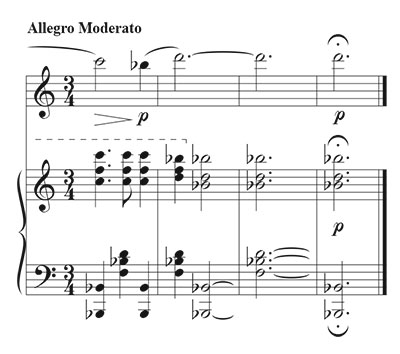The modern flute is a sharp instrument. Not as opposed to being blunt, but in terms of its intonation tendencies. Of course, it is also easy to play below the pitch in the softer dynamics and in the very low register. Beginners often tend to play a bit flat overall, but after a few lessons they learn to just blow harder to produce the top octaves. They achieve a more supported tone but then encounter the curse which plagues flutists of all levels: sharpness of pitch in many of the notes, especially at higher dynamic levels.
Sharp is as Sharp Does
If one listens to enough recordings and concerts from various schools and styles, one realizes that all flute players play sharp at times. It is easy to believe one is in tune but alas, it is not so. Flutists grow accustomed to sharpness and perhaps at times cannot differentiate between their brilliant timbre and higher pitch levels.
My teacher once related an early-career story. After a concert a colleague exclaimed to him, “Man, were you sharp!” “Thank you,” replied my teacher, thinking it a compliment. But the colleague continued, “No, I mean you were really out of tune.” This caused my teacher to rethink his tuning practices. Clearly his colleague did not agree with the old string player’s adage: “Better sharp than out of tune!” While it may be true that playing sharp sounds a bit better than playing flat on a string instrument, at least as far as the flute is concerned, sharp is, well, just out of tune.
It’s a Flute Thing
In orchestra especially, there are many reasons why it is easy to sound sharp. Often this has to do with the instruments surrounding the flute section. The clarinet, for example, is the flute’s evil twin. When played at louder dynamic levels, clarinets tend toward the flat side of the pitch. The opposite is true with soft dynamics; while flutists are trending south in pitch, they are heading north. The oboe’s first octave contains many notes that are easily flat, even in the loud range, and frankly, many fine oboists are loath to raise the pitch for anyone. It must be something they tell them their first day on the job: “Whatever happens, do not give in to those metal-tubed, reedless Philistines of sharpness to your right!”
While the string section may push pitch upwards in their higher range, they often end up on the low side of the pitch if they are playing open strings or in the lower octaves. We can also blame the overtone series: the major third of a chord must be played quite flat in order for it to avoid clashing with the other overtones, and that pitch level can be difficult to attain, especially if the scoring dictates forte in the top octave. Sometimes the interval of a sixth can cause trouble for similar reasons, and it is also easy to sound sharp on the 7th of a dominant 7th chord, where composers often place the top flute line. Certain keys are more problematic, those of Eb major and A major, for example.
When playing with a piano, flutists have a slight edge; the octaves are adjusted to achieve equal temperament. This is not an excuse to play sharp, but it can be a bit easier in general. One must then be equally on guard about flatness as well. Even in a piano dynamic, flutists can easily sound sharp by overcompensating for the tendency to be flat. This flatness occurs because the flute has slightly rolled in when the left-hand thumb has been removed for the C the measure before. However, since the final chord is a Bb major, the D, which is a major third above the Bb, should be lowered to be in tune. The pitch of this flatter D matches well with the compensation of the piano tuning.
Martinu First Sonata, 1st mvt

Still, as many flute and piano recordings will confirm, it is so easy to consistently sound above pitch when playing with a piano that I have occasionally thought flutists should adapt the popular Jeep bumper sticker for the music stand: “It’s a flute thing, you wouldn’t understand!”
Get Down
Why do flutists so easily play sharp and how can they prevent it? Almost all of the higher notes on the flute are fundamentally sharp, especially in the third octave. Much of this built-in sharpness is actually caused by even-tempered tuning and venting the first octave fingerings to ease tone production and clarity of these higher partials, decreasing tube length.
Additionally, as flutists increase air velocity in order to play the higher notes, the air column naturally rises, or becomes more horizontal. If the air column rises further than necessary for the desired note, sharpness of pitch occurs. It is possible to create an overabundance of air pressure within the instrument, especially if one blows too hard or rolls the instrument towards oneself too far, closing off the blowhole. The opposite, rolling the flute out too much, can create sharpness as well, as it artificially raises the air column. It is better to drop the jaw, letting the lower lip of the embouchure recede and then angling the air lower on the blowing edge.
Posture plays a role too. If the support for torso and head are sabotaged by incorrect pelvic position or hyperextended knees, the jaw cannot relax. Develop sensitivity towards the temperature of the instrument. A cold flute during tuning becomes warmer and the pitch sharper. Some basic work with a tuner can help, and there are now many online tools available for tuning work. Also, do not be shy about pulling the headjoint out. Narrow the vibrato more often and do not always vibrate above the pitch. Eliminate or substantially reduce vibrato when tuning and blending with other instruments. To practice intonation, ask a colleague to play duets or intervals.
Above all, listening rules the day. Study some recordings of flutists who have very good intonation, such as Julius Baker and Fenwick Smith. If you record yourself when practicing and listen properly, you are ahead already. Do not point fingers too readily in ensemble situations; keep asking yourself if you are the culprit when it comes to sharpness, and it will benefit your playing greatly.






